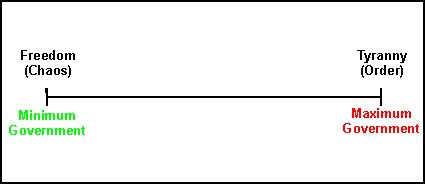Be careful giving up freedom to quell your fears.
“Of all tyrannies, a tyranny sincerely exercised for the good of its victims may be the most oppressive.” – C. S. Lewis
Here’s a simple civics lesson. Take a piece of paper and draw a horizontal line. Mark the ends of the line and label one end “No Government” and on the other end, label it “Maximum Government.”
Above the Minimum Government label write the words, “chaos” and “freedom” and above the Maximum Government label write the words “order” and “tyranny.”
Throughout most of history, humankind has found itself close to one end or the other of this line. Early in human history, it was chaos, which is the natural order of things. Humans preyed upon one another and only the strong survived. There was no police department. If you had food or some land or a desirable mate and if your neighbor was stronger than you, you gave up your food or your land or your mate. In chaos there is always fear and it was out of a need to quell fear that humans began to coalesce into tribes and small societies.
Out of those tribes and primitive societies, governments began to form. The basic role of government was then and is now to protect the citizens from the fear of the ravages of chaos. The first large scale governments included the Egyptians, the Mesopotamians and the Mayans.
All of these societies found themselves close to the “tyranny” end of the line. Fear of chaos was replaced by fear of the pharaoh or king, whose authority was absolute.
As time passed, the Greeks and the Romans created governments that were still tyrannical, only less so. The Romans invented the senate, but the emperor could still, on his own hook, levy taxes or order an execution.
Moving very quickly through history, you had the feudal system whose most famous practitioner was Charlemagne. There was a hierarchy that, in the simplest illustration, confiscated the fruits of the labor of the lowest members of society for the benefit of the higher members. Pretty tyrannical.
The British had a Parliament, which is representative by nature. But they also had a king, whose nature tends toward tyranny.
In the 18th century, a bunch of Brits got on boats and came to North America. Since then, the country that emerged has been trying to find the appropriate place on the line – the “sweet spot” that embodies the best compromise between absolute freedom and the resulting chaos and absolute order and the resulting tyranny.
In this time of great economic uncertainty, with our fear of terrorism, our fear of not being able to earn a sufficient living to provide for our needs, our fear of not being able to afford medical care, our fear of losing our houses, many of us turn toward the government. And that’s natural. Government can protect you.
But be careful in seeking that protection. Crime in Soviet Russia was a fraction of what we take for granted here. The Soviets were quite effective in keeping crime to a minimum but they accomplished this by keeping individual freedom to a minimum as well.
Rick Wagoner of GM and Alan Mullaly of Ford may be able to convince the Congress to loan billions of dollars to their companies. But as they quickly learned, they will endure the tyranny of being told how they may travel and how they may be compensated.
Government “protection” always comes at the price of a limitation on freedom. As just one example, to be protected on airplanes, you must surrender your freedom to bring your pocketknife or your tube of toothpaste on board.
Governments, or more precisely the people who work in and lead governments, tend toward tyranny. If you don’t believe me, go apply for a passport or a drivers license. You’ll see what happens when government has what you want that you can’t get anyplace else.
The point of this civics lesson is this. We have reached the point in our history at which government now proposes to protect us from the consequences of business failure, see to our retirement, provide our health care and fill our prescriptions.
Be very afraid.
As we accept more government we are, by definition, moving toward the “tyranny” end of the scale and away from the “freedom” end of the scale.
And freedom once surrendered is very hard to gain back.









I absolutely agree with you, and with Benjamin Franklin, “They who can give up essential liberty to obtain a little temporary safety, deserve neither liberty nor safety.”. Yet this is exactly what the current administration and the hawks in the Republican party have promulgated for the past 7 years. I will answer the immediate response from most who listen to this station I am not a Democrat, but neither am I a Repbulican, my orientation falls more along the lines or a social Libertarian. Members of my family have been in nearly every branch of the service and they have done so to secure the exact freedoms that we have all had removed from us by the patriot act and other similar legislation. Do we need the government, most certainly, but one should not depend upon the government to provide for them. The government should be in place to provide those services that it is either not feasible for the private sector to provide or are too important to depend on the private sector to provide i.e. public safety, national defense, etc. I hope that those who have supported such legislation live to see the fruits of there support because in the overall scheme it will be neither beneficial to those people personally, nor the country as a whole.